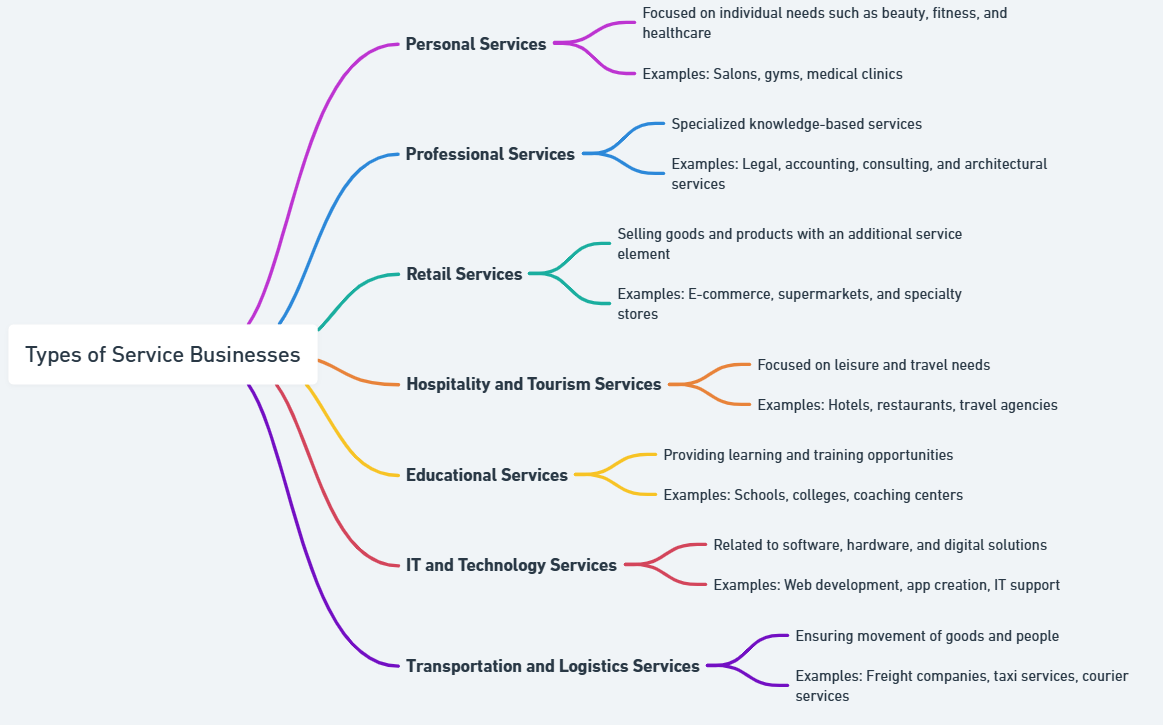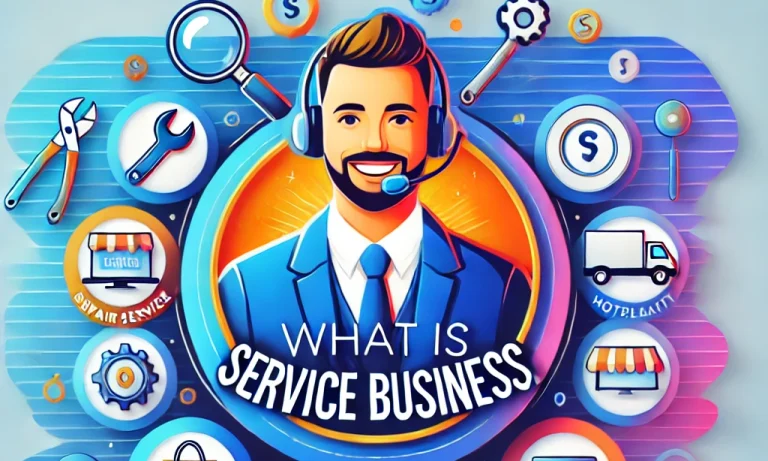A service business sells intangible products or services to customers rather than selling a physical good. These businesses are based on the delivery of value using experience, labor, or expertise. Examples include consulting firms, financial advisors, healthcare providers, and cleaning services. Service businesses are, therefore, not like product businesses, as they rely highly on customer relationships and quality of service to build and sustain success.
Service businesses make up a significant part of the modern economy, contributing to most of the GDP in developed countries. These businesses are based on customer satisfaction, providing solutions tailored to the needs of the individual or organization. In the digital economy, this model has evolved to include online consulting, virtual assistance, and cloud-based services, demonstrating the flexibility of the model.
What is a Service Business?
A service business serves customer needs through expertise, time, or specialized skills. These businesses don’t deal in physical inventory; instead, they deliver outcomes or experiences that improve customers’ lives or solve their problems.
Key Characteristics of a Service Business
- Intangibility: Services are non-physical and cannot be stored.
- Customization: Tailoring services to meet specific client requirements.
- Customer Interaction: Success depends on customer satisfaction and feedback.
- Human Capital: Employees’ skills and experience play a vital role.
Example: A marketing consultancy creates advertising strategies, helping businesses enhance their brand visibility. The service’s value lies in the expertise and innovative solutions offered.

Types of Service Businesses
Service businesses can be categorized based on their offerings or the industries they operate in. Below are the primary types:
1. Professional Services: Professional service businesses include law firms, accounting firms, consulting agencies, and marketing companies. They provide specialized expertise tailored to client needs.
2. Healthcare and Wellness: This category includes hospitals, clinics, fitness centers, and therapy services. Their primary goal is to enhance or maintain the health and well-being of individuals.
3. Hospitality and Tourism: Businesses like hotels, travel agencies, and tour operators offer experiences ranging from accommodation to travel planning.
4. Education and Training: Schools, universities, and vocational training centers fall under this category, providing learning and skill-building opportunities.
5. Maintenance and Repair: Businesses such as plumbing, electrical, and car repair services address functional issues for individuals and organizations.
| Type | Examples | Primary Focus |
|---|---|---|
| Professional Services | Legal advice, IT support | Expertise and problem-solving |
| Personal Services | Cleaning, Hairdressing | Personal convenience and well-being |
| Transportation | Courier services | Efficiency in movement |
| Healthcare | Physiotherapy | Improving health |
| Hospitality | Hotel management | Enhancing leisure experiences |
What is a Home Service Business?
A home service business delivers services at a customer’s home, catering to convenience and accessibility. These businesses include repairs, maintenance, and personal care, addressing clients’ needs without requiring them to leave their homes.
- High customer satisfaction due to convenience.
- Cost-effective as businesses operate without a retail space.
Examples of Home Service Businesses:
- Plumbing Services: Fixing leaks or installing appliances at home.
- Cleaning Services: Housekeeping for residential spaces.
- Personal Trainers: Offering fitness sessions in the comfort of a home.
How to Start a Service Business
Starting a service business requires careful planning and execution. Below is a step-by-step guide:
1. Identify Your Service: Choose a service you are skilled in or passionate about. Research market demand to ensure profitability.
2. Conduct Market Research: Understand your target audience, their pain points, and competitors in the field. This insight helps refine your service offerings.
3. Develop a Business Plan: A detailed business plan outlines your goals, budget, and marketing strategies. It serves as a roadmap for business operations.
4. Obtain Required Licenses: Ensure compliance with local regulations by acquiring necessary permits and certifications.
5. Build an Online Presence: Create a professional website and leverage social media to attract customers. Online visibility is crucial for credibility.
How to Run a Successful Service Business
Success in a service business depends on several factors, including quality, customer relationships, and efficient operations.
1. Focus on Customer Satisfaction: Provide excellent service consistently to build trust and retain clients. Positive reviews and referrals play a critical role in growth.
2. Train Your Team: Invest in employee training to enhance skills and ensure they represent your business effectively.
3. Implement Technology: Use software tools to streamline operations, such as scheduling, invoicing, or customer management.
4. Offer Personalized Solutions: Adapt services to meet individual client needs. Personalization enhances customer loyalty.
5. Monitor Financials: Track income and expenses to maintain profitability. Regular financial reviews help identify growth opportunities.
Service Business FAQs
What defines a service business?
A service business provides value by offering intangible services rather than physical products, focusing on customer needs.
Can a service business be run from home?
Yes, many service businesses like freelancing, tutoring, or digital marketing can operate from a home office.
What is the importance of customer satisfaction in service businesses?
Customer satisfaction ensures repeat business, positive referrals, and long-term success.
What are examples of technology used in service businesses?
Scheduling apps, CRM software, and online payment systems improve efficiency and customer convenience.
How can one differentiate a service business in a competitive market?
Focus on exceptional service quality, personalized offerings, and strong online branding to stand out.


